Related Research Articles

Arthur Neville Chamberlain was a British politician who served as Prime Minister of the United Kingdom from May 1937 to May 1940 and Leader of the Conservative Party from May 1937 to October 1940. He is best known for his foreign policy of appeasement, and in particular for his signing of the Munich Agreement on 30 September 1938, ceding the German-speaking Sudetenland region of Czechoslovakia to Nazi Germany led by Adolf Hitler. Following the invasion of Poland on 1 September 1939, which marked the beginning of the Second World War, Chamberlain announced the declaration of war on Germany two days later and led the United Kingdom through the first eight months of the war until his resignation as prime minister on 10 May 1940.

Sir Winston Leonard Spencer Churchill was a British statesman, military officer, and writer who was Prime Minister of the United Kingdom from 1940 to 1945 and again from 1951 to 1955. Apart from 1922 to 1924, he was a member of Parliament (MP) from 1900 to 1964 and represented a total of five constituencies. Ideologically an adherent to economic liberalism and imperialism, he was for most of his career a member of the Conservative Party, which he led from 1940 to 1955. He was a member of the Liberal Party from 1904 to 1924.

The Atlantic Charter was a statement issued on 14 August 1941 that set out American and British goals for the world after the end of World War II, months before the US officially entered the war. The joint statement, later dubbed the Atlantic Charter, outlined the aims of the United States and the United Kingdom for the postwar world as follows: no territorial aggrandizement, no territorial changes made against the wishes of the people (self-determination), restoration of self-government to those deprived of it, reduction of trade restrictions, global co-operation to secure better economic and social conditions for all, freedom from fear and want, freedom of the seas, abandonment of the use of force, and disarmament of aggressor nations. The charter's adherents signed the Declaration by United Nations on 1 January 1942, which was the basis for the modern United Nations.
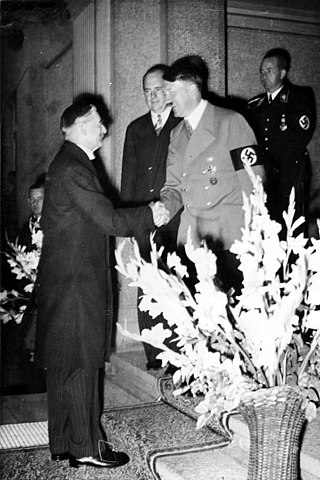
Appeasement, in an international context, is a diplomatic negotiation policy of making political, material, or territorial concessions to an aggressive power with intention to avoid conflict. The term is most often applied to the foreign policy between 1935 and 1939 of the British governments of Prime Ministers Ramsay MacDonald, Stanley Baldwin and most notably Neville Chamberlain towards Nazi Germany and Fascist Italy. Under British pressure, appeasement of Nazism and Fascism also played a role in French foreign policy of the period but was always much less popular there than in the United Kingdom.

Edward Frederick Lindley Wood, 1st Earl of Halifax,, known as the Lord Irwin from 1925 until 1934 and the Viscount Halifax from 1934 until 1944, was a senior British Conservative politician of the 1930s. He held several senior ministerial posts during this time, most notably those of Viceroy of India from 1926 to 1931 and of Foreign Secretary between 1938 and 1940. He was one of the architects of the policy of appeasement of Adolf Hitler in 1936–1938, working closely with Prime Minister Neville Chamberlain. After Kristallnacht on 9–10 November 1938 and the German occupation of Czechoslovakia in March 1939, he was one of those who pushed for a new policy of attempting to deter further German aggression by promising to go to war to defend Poland.

Alfred Duff Cooper, 1st Viscount Norwich,, known as Duff Cooper, was a British Conservative Party politician and diplomat who was also a military and political historian.
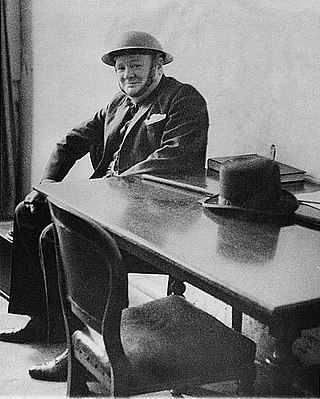
The phrase "blood, toil, tears and sweat" became famous in a speech given by Winston Churchill to the House of Commons of the Parliament of the United Kingdom on 13 May 1940. The speech is sometimes known by that name.
Christopher Catherwood, is a British author based in Cambridge, England and, often, in Richmond, Virginia. He has taught for the Institute of Continuing Education based a few miles away in Madingley and has taught for many years for the School of Continuing Education at the University of Richmond. He has been associated each summer with the University of Richmond's History Department, where he is its annual summer Writer in Residence, and where most of his recent books have been written.

An "Anthony Eden" hat, or simply an "Anthony Eden", was a type of headgear popularised in Britain in the mid-20th century by politician Anthony Eden, later 1st Earl of Avon (1897–1977). Eden, who was known for his sartorial elegance, favoured a silk-brimmed, black felt homburg at a time when most Britons preferred the trilby or the bowler. Eden held a number of cabinet posts in the 1930s and the 1940s, and was Prime Minister from 1955 to 1957.

The Churchill war ministry was the United Kingdom's coalition government for most of the Second World War from 10 May 1940 to 23 May 1945. It was led by Winston Churchill, who was appointed prime minister of the United Kingdom by King George VI following the resignation of Neville Chamberlain in the aftermath of the Norway Debate.
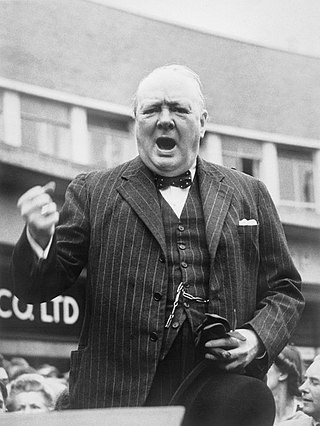
Winston Churchill's Conservative Party lost the July 1945 general election, forcing him to step down as Prime Minister of the United Kingdom. For six years he served as the Leader of the Opposition. During these years he continued to influence world affairs. In 1946 he gave his "Iron Curtain" speech which spoke of the expansionist policies of the Soviet Union and the creation of the Eastern Bloc; Churchill also argued strongly for British independence from the European Coal and Steel Community; he saw this as a Franco-German project and Britain still had an empire. In the General Election of 1951, Labour was defeated.
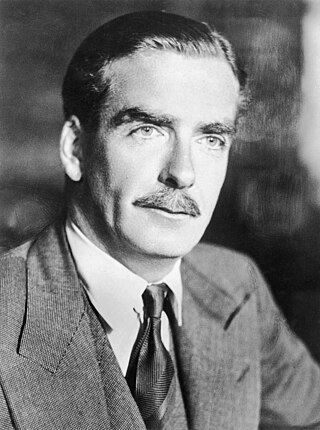
Robert Anthony Eden, 1st Earl of Avon, was a British politician who served as Prime Minister of the United Kingdom and Leader of the Conservative Party from 1955 until his resignation in 1957.
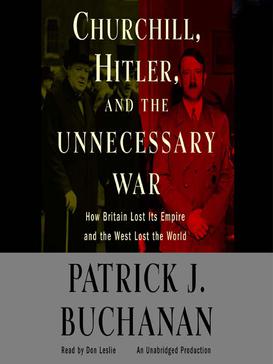
Churchill, Hitler, and the Unnecessary War: How Britain Lost Its Empire and the West Lost the World is a book by Patrick J. Buchanan, published in May 2008. Buchanan argues that both World War I and World War II were unnecessary and that the British Empire’s decision to join the wars had a cataclysmic effect globally. One of Buchanan's expressed purposes is to undermine what he described as a "Churchill cult" in America's elite. Buchanan focuses particularly on how Winston Churchill helped influence Britain into the world wars with Germany in 1914 and 1939.
A Total and Unmitigated Defeat was a speech by Winston Churchill in the House of Commons at Westminster on Wednesday, 5 October 1938, the third day of the Munich Agreement debate. Signed five days earlier by Prime Minister Neville Chamberlain, the agreement met the demands of Nazi Germany in respect of the Czechoslovak region of Sudetenland.
Peter L. N. Padfield was a British author, biographer, historian, and journalist who specialised in naval history and in the Second World War period. His early journalism appeared under the name P. L. N. Padfield. As well as his non-fiction work, he also published four novels.
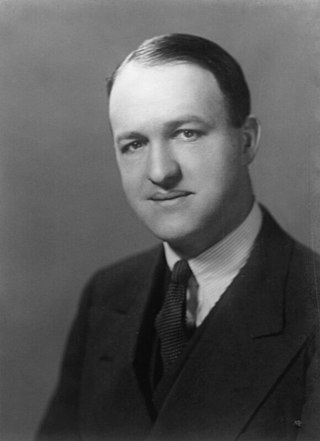
Richard Austen Butler, generally known as R. A. Butler and familiarly known from his initials as Rab, was a prominent British Conservative Party politician.

Throughout his life, Winston Churchill made numerous controversial statements on race, which some writers have described as racist. It is furthermore suggested that his personal views influenced important decisions he made throughout his political career, particularly relating to the British Empire, of which he was a staunch advocate and defender. In the 21st century, his views on race and empire are frequently discussed, and controversial, aspects of his legacy.

Winston Churchill was appointed First Lord of the Admiralty on 3 September 1939, the day that the United Kingdom declared war on Nazi Germany. He succeeded Neville Chamberlain as prime minister on 10 May 1940 and held the post until 26 July 1945. Out of office during the 1930s, Churchill had taken the lead in calling for British re-armament to counter the growing threat of militarism in Nazi Germany. As prime minister, he oversaw British involvement in the Allied war effort against the Axis powers. Regarded as the most important of the Allied leaders during the first half of the Second World War, Historians have long held Churchill in high regard as a victorious wartime leader who played an important role in defending Europe's liberal democracy against the spread of fascism. For his wartime leadership and for his efforts in overseeing the war effort, he has been consistently ranked both by scholars and the public as one of the top three greatest British prime ministers, often as the greatest prime minister in British history.

In 20th century politics, Winston Churchill (1874–1965) was one of the world's most influential and significant figures. He was Prime Minister of the United Kingdom from 1940 to 1945, when he led the country to victory in the Second World War, and again from 1951 to 1955. Apart from two years between 1922 and 1924, he was a Member of Parliament (MP) from 1900 to 1964. Ideologically an economic liberal and imperialist, he was for most of his career a member of the Conservative Party, and its leader from 1940 to 1955. He was a member of the Liberal Party from 1904 to 1924.

The Bibliography of Winston Churchill includes the major scholarly and nonfiction books and scholarly articles on the career of Winston Churchill, as well as other online sources of information.
References
- ↑ "John Charmley - Research Database, the University of East Anglia". Archived from the original on 24 November 2018. Retrieved 24 November 2018.
- ↑ "Prof John Charmley | St Mary's University". www.stmarys.ac.uk.
- ↑ ‘CHARMLEY, Prof. John Denis’, Who's Who 2014, A & C Black, an imprint of Bloomsbury Publishing plc, 2014
- ↑ "Maxwell P. Schoenfeld, 'Glorious Failure', Finest Hour 81".
- ↑ Leventhal, F. M.; Charmley, John (1992). "Chamberlain and the Lost Peace". The American Historical Review. 97 (1): 210. doi:10.2307/2164616. JSTOR 2164616.
- ↑ Langworth, Richard M. "Elvis Lives: John Charmley's Tabloid Winston" (PDF). Finest Hour 78.
- ↑ "Manfred Weidhorn, "Salvaging Charmley," Finest Hour 83, Second Quarter 1994".
- ↑ Correlli Barnett, The Verdict of Peace: Britain Between Her Yesterday and the Future (Pan, 2002), pp. 519–20.